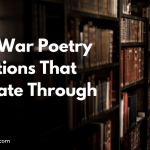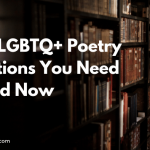Table of Contents
- Introduction
- 1. “The Future is Woman” by Maya Angelou
- 2. “Her Voice, Her Heart” by Amanda Gorman
- 3. “Unapologetically Me” by Rupi Kaur
- 4. “Sisterhood” by Claudia Rankine
- 5. “Feminine Mystique” by Audre Lorde
- 6. “Revolutionary Songs” by Ocean Vuong
- 7. “We Are Enough” by Warsan Shire
- Conclusion
- FAQs
Introduction
Feminist poetry serves as a powerful vehicle for expression, empowerment, and change. It not only reflects the struggles and triumphs of women but also resonates with anyone who values equality and justice. As we step into 2024, the literary world is brimming with compelling collections that amplify women’s voices and experiences. Here’s a curated list of the top seven must-read feminist poetry collections of this year.
1. “The Future is Woman” by Maya Angelou
Maya Angelou’s posthumous collection, The Future is Woman, encapsulates her unparalleled gift for weaving personal narrative with universal truths. This collection features previously unpublished poems alongside her iconic works. Each poem addresses the resilience and strength of women, urging readers to envision a world where women’s rights are prioritized.
Highlights:
- Themes: Empowerment, resilience, and hope.
- Notable Poem: “Still I Rise,” which celebrates the tenacity of women facing oppression.
“Angelou’s words resonate through time, reminding us of the strength inherent in womanhood.”
Why You Should Read It: This collection is essential for anyone who wants to understand the foundational ideas of feminist thought through the lens of one of the most influential poets of our time.
2. “Her Voice, Her Heart” by Amanda Gorman
In Her Voice, Her Heart, Amanda Gorman captures the zeitgeist of contemporary feminism through her eloquent and poignant verses. Known for her captivating performance at the 2021 presidential inauguration, Gorman’s latest work explores themes of identity, empowerment, and social justice.
Highlights:
- Themes: Identity, activism, and community.
- Notable Poem: “The Hill We Climb,” which speaks to perseverance in the face of adversity.
“Gorman’s words act as a beacon of hope, guiding the next generation toward activism and self-discovery.”
Why You Should Read It: Gorman’s work is not only poetic but also motivational. Her ability to inspire action makes this collection a must-read for young feminists and activists alike.
3. “Unapologetically Me” by Rupi Kaur
Rupi Kaur’s Unapologetically Me is a celebration of femininity and self-acceptance. With her signature minimalist style, Kaur addresses themes of love, loss, and healing. Each poem is accompanied by her distinct illustrations, making the reading experience visually and emotionally rich.
Highlights:
- Themes: Self-love, healing, and empowerment.
- Notable Poem: “The Light,” which encourages readers to embrace their true selves.
“Kaur’s art speaks to the soul, reminding us that vulnerability is a strength.”
Why You Should Read It: Kaur’s approachability and relatability make her work accessible to all, ensuring that readers feel seen and heard.
4. “Sisterhood” by Claudia Rankine
Claudia Rankine’s Sisterhood is a profound exploration of the complexities of female relationships. Through a blend of poetry and prose, Rankine examines the intersections of race, gender, and the bonds that tie women together.
Highlights:
- Themes: Intersectionality, community, and emotional depth.
- Notable Poem: “Citizen,” which powerfully addresses the experience of Black women in America.
“Rankine’s exploration of sisterhood is both a celebration and a challenge, urging women to unite across differences.”
Why You Should Read It: This collection challenges readers to reflect on their own relationships and the societal structures that influence them.
5. “Feminine Mystique” by Audre Lorde
Audre Lorde’s Feminine Mystique is a timeless collection that delves deep into the intersections of race, gender, and sexuality. Lorde’s powerful voice challenges societal norms and speaks to the necessity of embracing one’s identity.
Highlights:
- Themes: Identity, empowerment, and resistance.
- Notable Poem: “A Litany for Survival,” which emphasizes the importance of self-preservation.
“Lorde’s work is a clarion call for authenticity, urging us to resist the confines of societal expectations.”
Why You Should Read It: Lorde’s work remains relevant and necessary, inspiring new generations of feminists to speak out against oppression.
6. “Revolutionary Songs” by Ocean Vuong
Ocean Vuong’s Revolutionary Songs combines lyrical beauty with poignant social commentary. Vuong’s exploration of love, loss, and identity resonates with a diverse audience, making this collection a modern classic.
Highlights:
- Themes: Love, identity, and social justice.
- Notable Poem: “Night Sky with Exit Wounds,” which reflects on personal and collective trauma.
“Vuong’s voice weaves a tapestry of experiences, inviting readers to reflect on their own narratives.”
Why You Should Read It: Vuong’s unique voice and perspective offer a fresh take on feminist poetry, making it essential reading.
7. “We Are Enough” by Warsan Shire
Warsan Shire’s We Are Enough is a celebration of womanhood and resilience. Through her evocative imagery, Shire tackles issues of migration, displacement, and the strength found in community.
Highlights:
- Themes: Migration, resilience, and self-acceptance.
- Notable Poem: “Home,” which speaks to the longing for belonging.
“Shire’s poetry is a powerful reminder that our stories are valid and worthy of being shared.”
Why You Should Read It: Shire’s work is a reminder of the beauty in diversity and the power of shared experiences.
Conclusion
The feminist poetry collections of 2024 offer a rich tapestry of voices and perspectives that challenge societal norms and inspire change. Each collection not only provides insight into the female experience but also encourages readers to reflect on their own lives and the world around them.
Ready to dive in? Grab your copies and join the conversation!
FAQs
Q: What is feminist poetry?
A: Feminist poetry is a genre that explores themes related to women’s rights, gender equality, and the female experience, often challenging societal norms and injustices.
Q: Why is feminist poetry important?
A: Feminist poetry amplifies women’s voices, fosters understanding, and encourages social change. It serves as a platform for expression and empowerment.
Q: Where can I find these collections?
A: These collections can be found at major bookstores, online retailers like Amazon, or local libraries.
Q: Who are some other notable feminist poets?
A: Other notable feminist poets include Sylvia Plath, Nikki Giovanni, and Elizabeth Bishop.
For further reading on feminist literature, you can also explore works on feminist classics that have shaped contemporary thought and inspired new generations of writers.



